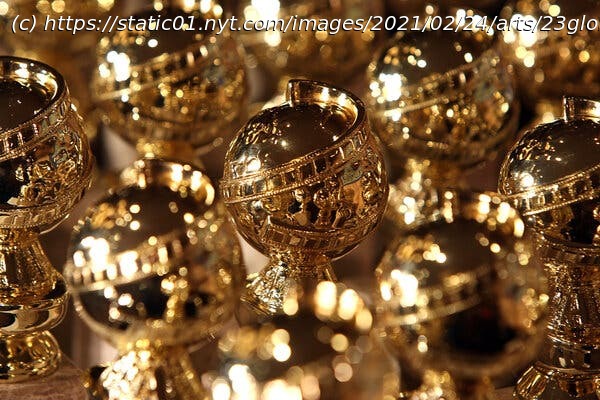Members of the tax-exempt Hollywood Foreign Press Association, which puts on the ceremony, are courted by stars and studios, and sometimes paid.
The Hollywood Foreign Press Association has been widely viewed as colorful, generally harmless, perhaps venal and not necessarily journalistically productive. But because the group puts on the Golden Globes, courting the favor of its members — there are only 87 — has become a ritualized Tinseltown pursuit. Celebrities send them handwritten holiday cards. Studios put them up at five-star hotels. Champagne, pricey wine, signed art, cashmere blankets, slippers, record players, cakes, headphones and speakers are among the gifts that have arrived at their doorsteps, recipients say. The suitors — studios, production companies, strategists and publicists — are all chasing the same thing: members’ votes. Every one counts. A Golden Globe nomination, and certainly a win, is a publicity boon that can boost careers, jack up box office earnings and foreshadow an Academy Award. Boozy, irreverent and generally jolly good fun, the Globes are the third most-watched awards show after the Grammys and the much more staid Academy Awards. The show occupies a curious place in the entertainment industry. Mocking the Globes, and their occasionally off-the-wall nominations and picks, as irrelevant has become an annual blood sport in the Hollywood press, which covers them anyway, and the association’s members, many of whom work for obscure outlets, are regularly painted as doddering, out of touch and faintly corrupt. “The Golden Globes are to the Oscars what Kim Kardashian is to Kate Middleton,” Ricky Gervais, who has hosted them multiple times, said at the ceremony in 2012. “Bit louder. Bit trashier. Bit drunker. And more easily bought, allegedly. Nothing’s been proved.” But on the eve of the Feb.28 show, a recent lawsuit and a series of interviews and financial records are providing a more unsparing look at the group, which does not publicly list its roster, admits very few applicants, and, despite being a media association, has some members who say they are fearful of speaking to the press. The group is also coming under increased scrutiny from news organizations, including The Los Angeles Times, which recently delved into their finances; one of its findings, that the group has no Black members, made headlines. The latest re-examination began last year when Kjersti Flaa, a Norwegian reporter who has thrice been denied admittance to the group, and whose romantic partner is a member, sued the organization, saying that it acted as a monopoly, hogging prized interviews even though relatively few of its members actively worked as journalists. Studios went along to ingratiate themselves, she said, because of the value of the members’ votes. “It’s very obvious who’s important for the studios and who’s not,” Flaa said in an interview. “And the thing is, no one has said anything about this before. It’s just been accepted.” Members are territorial and loath to welcome competitors, she alleged, lobbying each other to accept or deny entry to new applicants, with little consideration for journalistic merits. Flaa pointed to a fracas involving a Russian member who in 2015 was accused of demanding that a Ukranian applicant not write for any Russian outlets and hand over her extra Golden Globes tickets — and guarantee her promise in a notarized letter — in exchange for being considered for admission. Flaa said outsiders had a nickname for the association: “The cartel.” The association would not comment specifically on the 2015 incident, but Gregory Goeckner, the organization’s chief operating officer and general counsel, said that such actions were prohibited, and that in 2018 its board approved a policy confirming any such letters as “void and unenforceable.” Goeckner also described Flaa’s allegations as “salacious,” and said it was studios, not the association, that made decisions about press access. A judge threw out the majority of Flaa’s suit, but she has recently amended it, and another journalist who also has been denied entry to the association has joined her complaint.
Home
United States
USA — Cinema The Golden Globes’ Biggest Winner May Be the Group That Hands Them...






